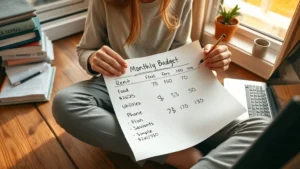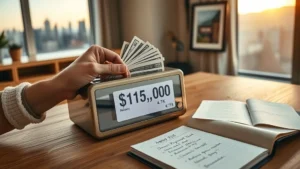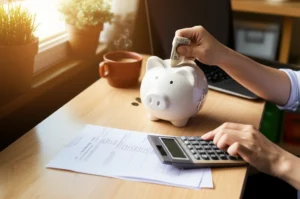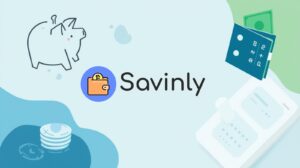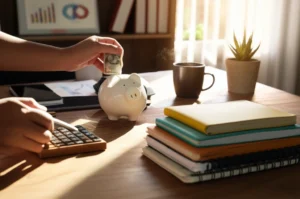“Wait…Saving Comes First?”
Ever found yourself standing in a checkout line, holding something totally ordinary—maybe a kitchen gadget, or even that extra bottle of shampoo you didn’t actually need? You swipe your card, tell yourself it’s just a few bucks, and forget about it by the time you’re home. But have you ever sat down at the end of the month, looked at your account and wondered… where did the money even go?
Story of my life, honestly. There were months where my bank account looked like one of those store-bought cakes somebody already took a big chunk out of. Rent, groceries, bills, a random pizza or three… poof! Gone. But here’s a truth bomb: a great principle for saving money is, “start paying yourself and (not just your landlord, or your streaming service). This simple mindset… total game changer. Not complicated. Not rocket science. Let’s get into why.
Old Rules vs. New Habits
Why Push Saving to the Front?
So. Why this “pay yourself first” thing? Well, most of us got taught to pay our bills, buy our stuff, then—maybe—save whatever scraps are left behind. Spoiler: that “leftover” is almost always zero. Honestly, you know what’s legit? Treating your own financial future as the first bill to pay, not the last. Even if it’s just $10 a week. You’re putting your needs first—not just current-you, but future-you. (And future-you really wants to take that trip, fix that car, or sleep through the night without money worries.)
How’s This Any Different … Really?
Picture two versions of you.
| Old Way | Pay Yourself First | |
|---|---|---|
| What Happens First? | Bills, spending, then savings—maybe | Savings for you, before anything else |
| End of Month Mood | “Wait—where’d it all go?” | “Hey, I actually kept some!” |
No leftovers, no guilt at the end of the month… just a small stash slowly building. (Which feels weirdly good. Like finding a forgotten $20, except it’s on purpose.)
Saving…But for What?
What Are the Three Reasons to Save Money?
Good question. Most folks save for three main things: safety, opportunity, and peace. Think of the first foundation is: save as—seriously—the foundation under your whole financial “house.” Sometimes you’re saving so that emergency vet bill doesn’t knock you flat. Sometimes, it’s for a shot at something cool (like a last-minute adventure or a chance to invest). And sometimes, you’re just buying peace of mind. Savings don’t just sit there—it works, quietly, on your behalf.
Me? My first “grown up” emergency fund literally paid for a phone I dropped into a lake. Did it sting? Sure. But it didn’t wreck my whole month, thanks to Future Me for thinking ahead.
Why Prioritize An Emergency Fund?
If you’re wondering, why is it important to make an emergency fund your first financial priority?…just ask anyone who’s had a pipe burst, a car break down—or lost work suddenly. Bills don’t wait for your “okay.” Savings let you handle life’s not-so-fun plot twists with a little less stress. (Side note: Life’s weird. Every time I start feeling “safe,” something random happens—a dental bill, a parking ticket. It’s like the universe is rooting for my emergency fund.)
Simple Tricks For Getting Started
Can Anyone Really Automate Savings?
Totally! You don’t need to be Warren Buffet, trust me. Even $10 a week is a start. The real trick? Automate it. Set up your bank so part of every paycheck jumps into savings before you even see it in your checking. Treat it like a bill—you’d never just “forget” rent, right?
There are even apps now that round up your daily purchases and tuck the “spare change” into savings. (Coffee: $3.27, app rounds up to $4.00, that $0.73 goes straight to you, not Starbucks.) It’s invisible, painless. And over a year? That little trick can add up to real cash.
Comparing Saving Methods
| Method | Effort | Consistency | Results |
|---|---|---|---|
| Savings at Month-End | High (you remember, but maybe forget…) | Low | Inconsistent, if anything left |
| Automated Savings | Set-up once, then forget about it | High | Money stacks up (even if you don’t notice in the moment) |
Can Bills or Late Fees Sabotage Your Progress?
Honestly, yeah. It’s happened. If you make a late credit payment, you might see the lender add fees that devour your savings. Super-annoying, and it stings. One missed payment and suddenly you’re spinning your wheels, playing catch-up. Solution? Set up auto-pay, alarms on your phone, whatever keeps you on track. (Bonus tip: check your statements… sometimes you catch sneaky subscriptions that can be cancelled, too.)
And don’t be too hard on yourself if you slip. We’re all human. I’ve been there—twice. Just forgive, reset, and get back to paying yourself first. It’s a marathon, not a sprint.
Making Your Savings Grow: The Fun Part
What’s This “Rate Of Return” Business—And Does It Matter?
Okay, maybe this sounds a bit “finance-y,” but stick with me. “rate of return” is a phrase used to describe what aspect of investing? It’s just how fast (or slow) your money grows while it’s sitting in savings, a CD, or maybe an index fund. Imagine a race: two runners, one limping along at 1% growth, another sprinting at 5%. Guess which one buys more coffee after a few years?
You don’t need to be a stock market genius. High-yield savings accounts, CDs, or even micro-investing apps can make your money work harder for you, with low risk. If you’re just getting started, keep it simple: look for options with no crazy fees, check their rates—sometimes even an extra 1% can mean hundreds of dollars over time, with almost zero effort.
Beginner-Friendly Saving & Investing Table
| Option | Typical Return | Easy To Access? | Risk Level |
|---|---|---|---|
| Standard Savings | 0.1–0.5% | Yes | None |
| High-Yield Savings | 1–5% | Yes | None |
| CDs | 3–6% | After a set period | Very Low |
| Simple Investing Apps | Varies, often 5%+ | Sometimes | Varies by app |
If this feels overwhelming, just start with what you know. Later, when you’re ready, take a peek at what else is out there. Baby steps.
So, How Much Should I Save?
No one-size-fits-all. (Annoying answer, I know.) Most pros—yes, even research on pay yourself first budgeting—suggest setting aside 10–20% of your paycheck for savings. But hey—anything is better than nothing. I started with $50/month, then upped it as I got raises, or cut down phone bills.
Try this: Next time you get paid, before you settle the bills, move just something to savings. Could be $5. Could be $50. Just do it before you see what’s “left over.” Over time, you may even forget you’re saving—and that’s when the magic happens.
Small changes really do add up! Once, just by switching cell plans and unsubscribing from one silly streaming service, I gave myself an instant $25-per-month raise (and didn’t miss a thing). That “found” cash went straight to my travel fund.
Real Talk: It’s Not About Being Perfect
What If I Mess Up…Or Can’t Stick To It?
You’re not alone. There’ll be weeks the car guzzles your whole savings. Some months you’ll “forget” a transfer, or accidentally dip into your fund for takeout (been there, trust me). That’s life. Forgive. Reset. Go again. Remember, a great principle for saving money is, “start paying yourself and believing every small win counts.
It’s not about shaming yourself into keeping every penny. It’s about designing your habits so good things—like saving—happen almost automatically. No heroics. Just quiet, consistent wins.
Now What? Your Next Step
Alright friend, let’s make this real. Maybe your “random purchases” are eating more than you thought. Maybe you thought you had to be rich or disciplined to save. Not true. Pick an amount (seriously—even a few bucks). Move it straight to savings the next time you’re paid. Make it automatic so you don’t sweat it every paycheck.
Want to make your savings safer? Remember that the first foundation is: save. Not just for fancy goals, but for emergencies—those moments when life throws you a weird curveball. Wondering why is it important to make an emergency fund your first financial priority?? So those little crises (and ticket fines, and car tires, and broken phones) don’t break you. Stay alert too, because if you make a late credit payment, you might see the lender add fees that can eat your good progress, but with your new system, you’ll be ready.
Over time, as your little pot grows, you get to geek out over fun stuff (like wondering “rate of return” is a phrase used to describe what aspect of investing?), but that’s icing on the cake.
You’ve so got this. Try just one tweak this month. Hide a little from yourself. Imagine the little wins piling up—less stress, more freedom, fewer regrets at the end of the month. What’s your next move? Shout it out below, or keep it private…as long as you promise you’ll treat that future-you as the VIP they really are. Here’s to your next small (but powerful) money win!





